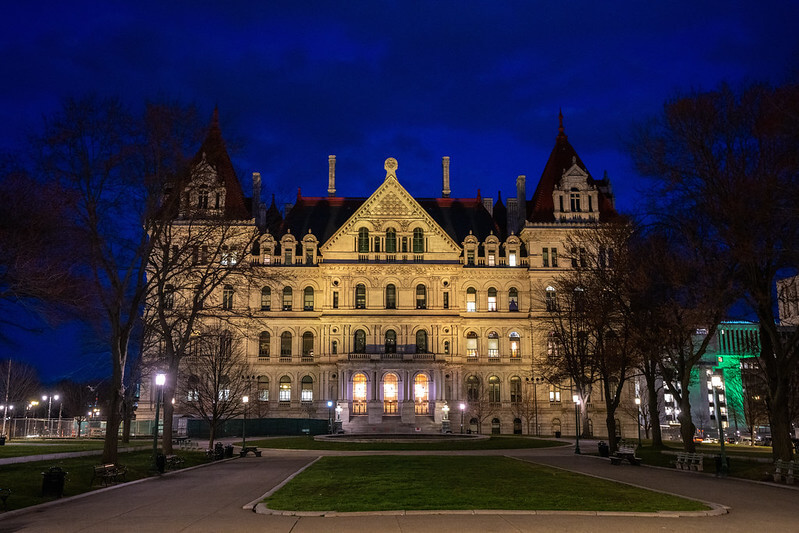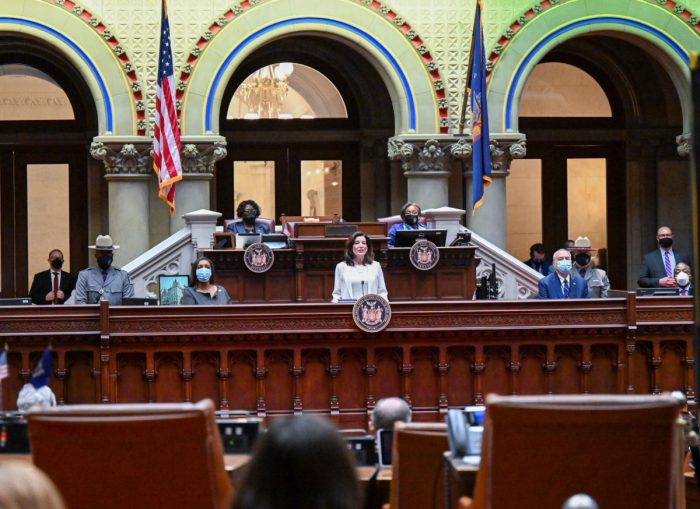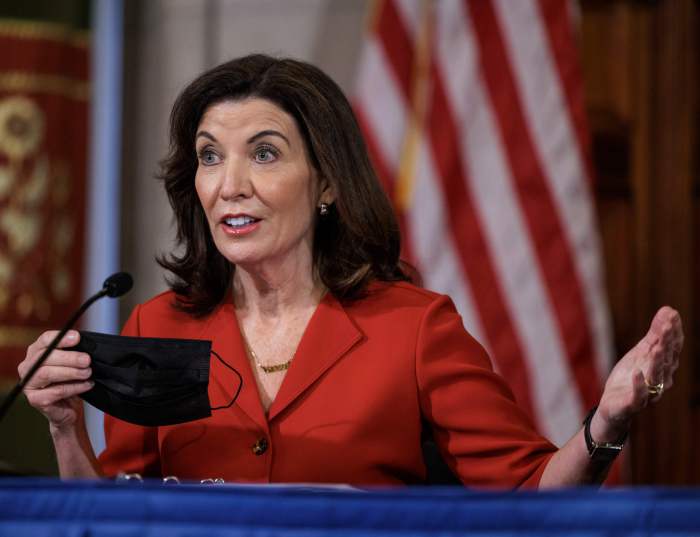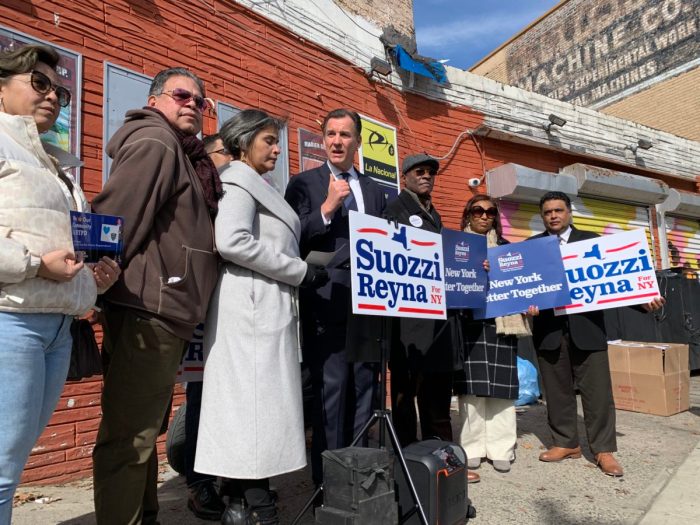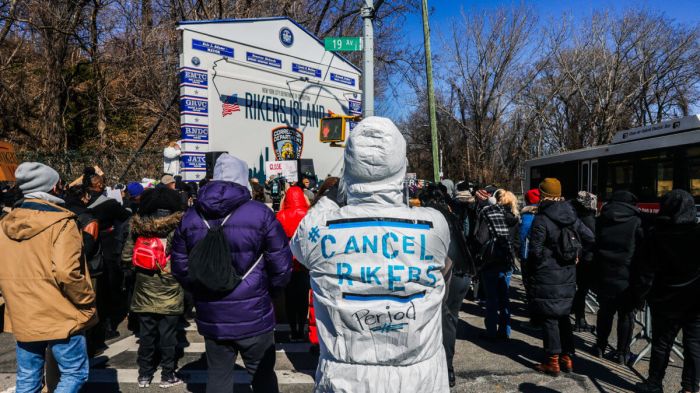The state budget will be late this year due to tough negotiations between Governor Kathy Hochul and Albany lawmakers over her bail reform rollback proposal and housing plan, the governor, state Senate Majority Leader Andrea Stewart-Cousins and Assembly Speaker Carl Heastie announced separately Thursday.
Hochul first said her proposed $227 billion executive budget would almost definitely blow past its April 1 deadline, this Saturday, during a radio interview with New York State Public Radio’s Karen DeWitt on Thursday afternoon.
“It’s becoming clear that the budget will not be meeting the April 1 deadline,” Hochul said. “But as I have said all along, it’s not about a race to a deadline, it’s about a race to getting the right results.”
Stewart-Cousins, in a news conference inside the state Capitol on Thursday afternoon, indicated they likely won’t meet the deadline because lawmakers are still in the thick of negotiations with the governor over her proposed budget.
“There’s just a lot of big policy issues that the governor had put in her budget that require discussions that we are all happy to have and we are having,” Stewart-Cousins told reporters.
“Everything is on the table, you’re gonna hear me say that a lot,” she added. “That’s why I’m saying we’re in the middle of the middle.”
The majority leader said she doesn’t anticipate a “very late” budget but that she expects negotiations to continue into next week.
“We’ll keep working, we keep working,” she said. “We’ve been rather good about getting timely budgets. And we respect the people of New York, and we respect the fact that they expect us to get this done. So I don’t anticipate a very late budget. We will be back next week it seems, but again we’ll be working through the weekend.”
Additionally, Stewart-Cousins said, she expects her chamber will pass a budget extender, which prolongs the current budget, so that state workers can be paid on time.
During his own Thursday afternoon news briefing in the state Capitol, Heastie said discussions around Hochul’s bid to tweak the bail laws by eliminating the “least restrictive standard” and the details of her plan requiring municipalities to meet housing production targets are the main issues holding up the budget.
“I would say those two issues are taking up most of the oxygen in the room and I’d say a few days ago it was probably taking up just about all of the oxygen in the room,” Heastie said. “Discussions on other subjects are ongoing.”
Heastie said a budget deal might be reached by Monday and indicated his chamber will likely also pass an extender by then.
The budget was late last year by nine days, following Hochul’s unsuccessful attempt to change the state’s bail laws, which were passed in 2019 and eliminated cash bail for most misdemeanors and non-violent felonies.
This year, negotiations around Hochul’s latest attempt to tweak the laws have been just as fraught, with both Stewart-Cousins and Heastie leaving her proposal out of their chambers’ budget proposals. Hochul argues removing the standard — which requires judges to use the least restrictive method for bringing defendants back to court when setting bail — would clear up confusion amongst judges about which crimes they can set bail for.
When asked about a Wednesday night report from Politico New York that his own conference had proposed removing the least restrictive standard for certain offenses, Heastie sidestepped.
“In the midst of all kinds of negotiations, normally ideas get exchanged, it’s nothing different,” Heastie said. “The Senate puts ideas out there. The governor puts ideas out there. We put ideas out there. And then you see what happens.”
Heastie, however, said there is room for compromise when it comes to tweaking the laws.
“I think there’s always room for compromise, particularly when it comes to clarifying things that we believe are in the law,” he said. “So, if things need to be cleared up, we don’t have an issue with clarifying what in the view is judicial discretion.”
Stewart-Cousins said that it’s important to keep the “integrity” of the 2019 reforms — preventing those charged with low-level crimes from having to languish in jail simply because they don’t have enough money to post bail — while also “clarifying” judges’ discretion.
“We cannot support a system that basically keeps you in jail because you’re accused of a misdemeanor because you don’t have the money,” she said. “That’s what we did. And so we want to keep the integrity of that … We’re trying to again, make sure that we keep the integrity of the law while we clarify the judges discretion.”
There’s also daylight between Hochul and the state legislature on her housing plan, which seeks to build 800,000 new units over the next decade by requiring localities around the state to meet housing production targets. Under the plan, downstate municipalities would have to build housing at a 3% rate every three years and upstate jurisdictions would have to build at a rate of 1% over the same period — with the state having the ability to override local zoning laws and take over the process for areas that fail to reach their targets.
In their own budget plans, the Senate and Assembly maintained the production targets, but replaced the mechanism to override local zoning rules with a more generous pot of incentives for housing construction. In the Senate’s case, Stewart-Cousins said that’s because she prefers the carrot to the stick approach.
“Our one-house never included any mandates,” she said, referring to her chamber’s budget plan. “And again, as I’ve always said, I’m not opposed to the stick, as they say, but I don’t like to start with sticks. I want to start with carrots and community engagement so that we can get to the end that we’d like.”



